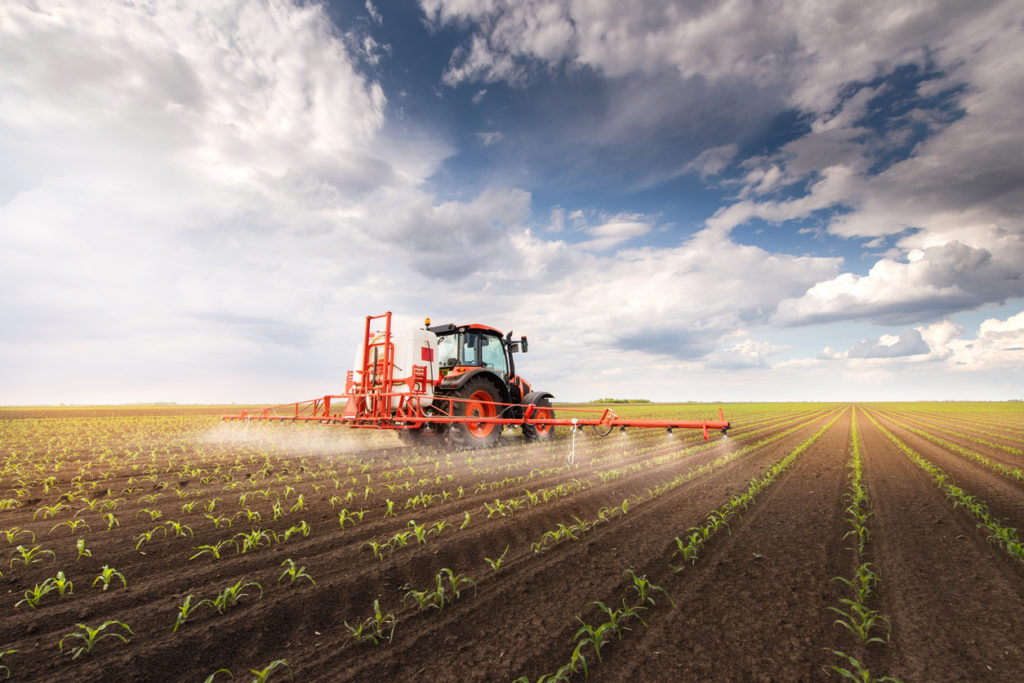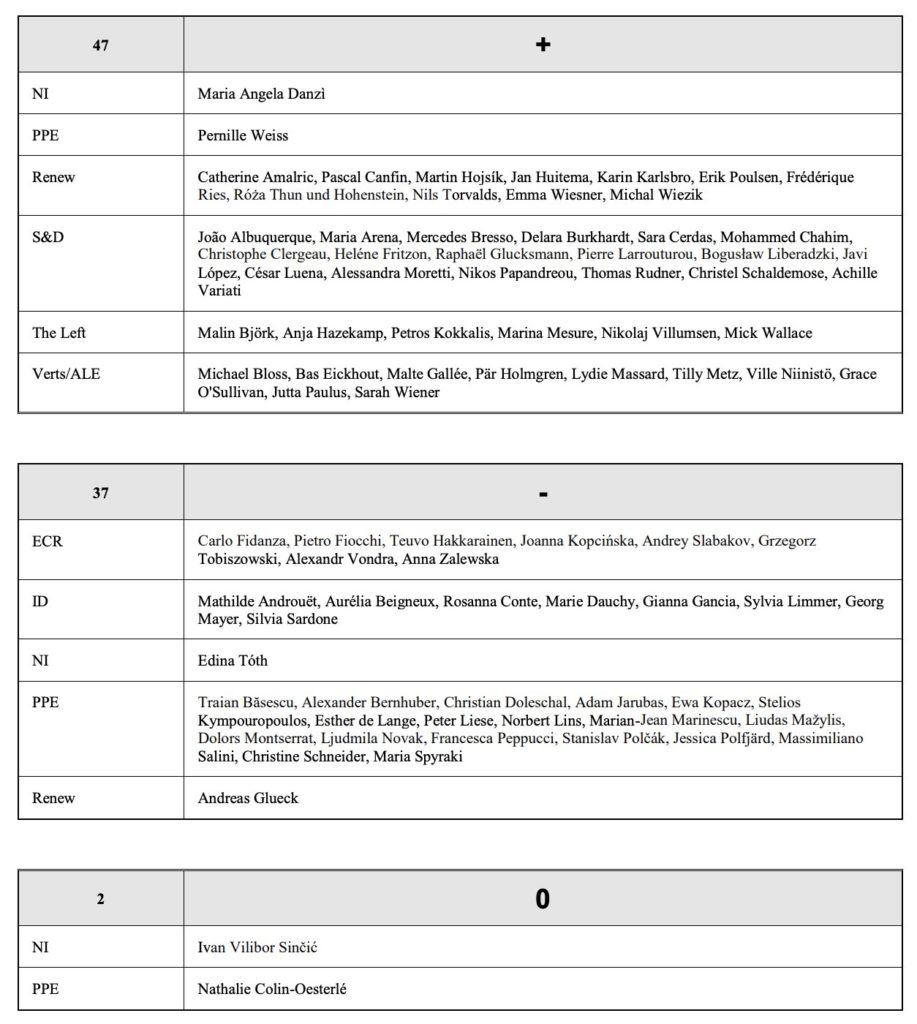
The Environment Committee in the European Parliament (ENVI) has ensured a core part of the EU Green Deal – the pesticide regulation – progress towards completion. In a vote yesterday (24th October) the SUR – sustainable use of pesticides regulation – saw some changes introduced, but progress maintained. Despite many delays over the regulation since last June, the SUR text will now face a plenary vote by all Members of the European Parliament (MEPs) in November, followed by future negotiations with member states once they too have finalised their positions. By Ashley Parsons and Oliver Moore.
So what happened?
The target of 50% of pesticide reduction in the EU by 2030 is now embraced in the text approved by the MEPs of the Environment Committee (ENVI) with 47 votes in favor, 37 against, and 2 abstentions, extends the reference period for these reductions.
The SUR legislation, backed by left-leaning and centrist Renew Europe Group MEPs, elevates the reduction target to 65% for the “most dangerous products” by the same deadline, in contrast to the 50% proposed by Brussels. The European People’s Party (EPP) has vehemently opposed this target, echoing the sentiments of major agricultural organisations and groups such as the pesticide lobby.
In a bid to promote the use of “substitution components,” MEPs have called upon the European Commission to set a target for increasing the sales of “low-risk pesticides” and biocontrol products by 2030. They also urge Brussels to expedite its authorisation procedures for these alternatives.
With ENVI at the forefront of the parliamentary process, this vote marks a pivotal step forward in negotiations. The approved text reflects compromise amendments that received broad support from Renew Europe, the Left (GUE/NGL), The Progressive Alliance of Socialists and Democrats, and the Greens/EFA.

Gaps and Omissions
Despite these advances, some crucial provisions for protecting citizens and the environment remain unaddressed. Provisions regarding crop-specific rules have been somewhat diluted, while important new measures for monitoring pesticide residues in the environment and in humans, regulating the import and export of active substances and pesticides, and providing access to justice have been introduced.
One notable change is the shift in the reference period for calculating reductions, now spanning from 2013 to 2017, which reduces the level of ambition. The “heavily flawed method to calculate pesticide reduction, the so-called called Harmonised Risk Indicator 1,” remains misleading and needs critical improvement, according to Natalija Svrtan from Pesticide Action Network (PAN EU)
Also, while the Commission initially proposed a total ban on pesticides in all sensitive areas, the approved text permits the use of biocontrol products and products allowed in organic farming. It also allows for exceptions for the use of other substances in these areas.
The definition of sensitive areas has also been revised. Certain areas, as designated under Annex IV of the Water Framework Directive, “for the protection of habitats or species where the maintenance or improvement of the status of water is an important factor in their protection” have been removed. The responsibility to identify protected nature areas beyond Natura 2000 areas as sensitive areas now falls to member states. Rapporteur of the legislation, Sarah Wiener, said in a press conference after the vote, “In plenary we’ll talk with the AGRI committee what is bothersome about that, what isn’t enough and what a compromise could be.”
As the legislation progresses, there is a pressing need to address the remaining shortcomings in the text. The upcoming plenary vote scheduled for the week of November 20th presents an opportunity to rectify these issues, ensuring that decisions are firmly grounded in science and prioritize the public interest, as expected by European citizens.
The upcoming plenary vote will serve as a litmus test of the EU’s dedication to these principles. Wiener insists, “What happened today is not the final SUR but a clear and strong position for ongoing negotiations in plenary and the trilogues as well.”
Yielding results – Impact Assessments and their Assessments
For its part agri lobby Copa-Cogeca said the ENVI proposal “will go through the Plenary session with unrealistic targets, impractical provisions such as on sensitive areas, and with few concrete solutions to offer”.
It claimed “All studies carried out on the European Commission’s proposal have already pointed to major production cuts, seriously impacting our strategic autonomy. In the current agricultural, economic, and geopolitical context, this decision by the Environment Committee reveals a certain frivolity!” (emphasis in original)
However, two impact assessments have been conducted, as we’ve covered over the months. The Commission letter with regard to the request for a second impact assessment, in December 2022 states:
“The pesticide reduction goals envisaged in the SUR proposal would not threaten food security. On the contrary, they would safeguard food security in the longer term. Analysis shows that the crops with yields most directly affected by pesticide reductions have limited relevance for food security. Member States have great flexibility to determine how to approach pesticide reduction in ways that do not impact on food security. The restoration of nature and the protection of pollinators, partly through pesticide reduction, will help guarantee the EU’s long-term food and feed security.” (Read the full letter here).
Moreover, the full impact assessment itself does point to the importance of all relevant actors to properly accept and implement pesticide reduction targets: “an unmanaged or badly managed reduction in pesticide use may indeed lead to yield reductions, but a well-managed transition will not have such negative effects”.
Importantly, reference is made to “several publications have attempted to provide estimates of the potential impacts of achieving the Farm to Fork targets, including the SUR pesticide reduction targets.”
It notes that “none of the publications can be considered a fully-fledged impact assessment of the policy.” they do however “introduce assumptions” which point to yield reductions which “were not derived through data-driven estimations but rather expert-elicitations or explorative assumptions.” These assumptions inter alia mean “an accurate yield response function to assess the effects of a lower pesticide use on yields is lacking” while yield reductions percentages given are “not well supported by the evidence” in particular with regard to “potential differences across crops and bioclimatic regions.” Moreover “alternative strategies to pesticides that do not result in yield losses were not assessed”, nor were demand side adjustments or price nudges.
The report also emphasises that recent historical evidence suggest pesticide reduction can happen without yield reduction. “the underlying transformation in the pesticide use and risk has not caused significant cost increases… the average yields per hectare across the EU for cereals, pulses, root crops, oilseeds, and vegetables do not exhibit a clear downward trend as would be suggested by the modelling studies…that had assumed direct yield repercussions following any reductions in pesticide use and risk.”
It concludes “hence, it is likely that all analyses produced worst case estimates …which arise out of a limited representation, or a lack of representation, of the ability of the EU food system to adapt and innovate.”
More
A Frugal Farm to Fork – Update on Pesticides, new GMOs, Animal Welfare & Sustainable Food Systems
Glyphosate Approval Fails to Get Qualified Majority – What’s Next?
Agri MEPs Move to Weaken Pesticide Regulation and Starve it of CAP funds
Commission Releases Slew of Agri-Food Documents before Summer – here’s what you need to know.
SUR – Pesticide Regulation – Delayed by Additional Impact Assessment





